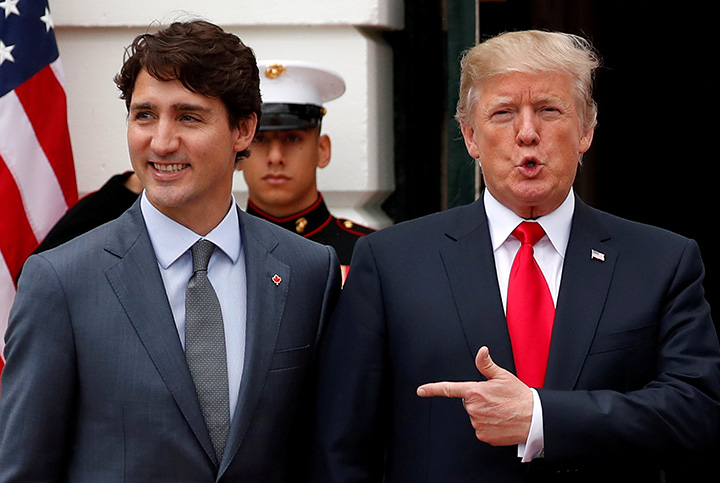UPDATE: 4:45 p.m. — The U.S. and Mexico have cancelled their plans to publish the details of a NAFTA-linked deal so that Canada can have more time to come on board, Reuters reported.

The text of the Trump administration’s trade agreement with Mexico is due to be released on Friday, launching a contentious U.S. approval process as pressure mounts on Canada to join its partners in revamping the NAFTA pact.
Mexico’s Economy Minister Ildefonso Guajardo was scheduled to present the text of the Aug. 27 agreement, which aims to rebalance auto trade and modernize parts of NAFTA, to Mexico’s Senate at 7 p.m. EDT (2300 GMT), Mexican government and Senate sources said.
Mexican Senator Ricardo Monreal said on Twitter the text will be released simultaneously in Mexico and the United States.
WATCH: Trump slams Canada on NAFTA

A Trump administration official and U.S. congressional aides said it would be released on Friday, but a spokesman for U.S. Trade Representative Robert Lighthizer declined to comment on the timing.
U.S. lawmakers briefed by Lighthizer on Thursday said they expected the text to largely exclude language related to Canada, a key U.S. trading partner and the third member of NAFTA, which underpins $1.2 trillion in trade between the three nations.
They expressed hope Canada would join in a trilateral trade deal, but were not optimistic it would happen quickly. Several weeks of U.S.-Canada talks in Washington have failed to overcome divisions over dairy trade and how to settle future disputes.
Some U.S. Democratic lawmakers said they could not support a NAFTA deal without Canada.
“Canada is exceptionally important. I think it would be malpractice, both for economic and political reasons, not to have a major agreement with Canada,” said Senator Ron Wyden, the top Democrat on the tax and trade Senate Finance Committee.
“I think leaving Canada out of a new deal amounts to the Trump administration surrendering on fixing NAFTA.” Wyden is from Oregon, a state that trades more with Canada than Mexico.

President Donald Trump, a Republican who blames the 1994 NAFTA pact for the loss of U.S. manufacturing jobs, trumpeted the deal with Mexico as a win for Americans and threatened to close the door on Canada if it did not sign on by Sept. 30.
Trump also floated slapping auto tariffs on Canada, a move that could sow disarray in supply chains, take the wind out of the sails of a resurgent Canadian economy and rattle investors already unnerved by an escalating U.S.-China trade war.
Canada’s Liberal government says it does not feel bound by the latest NAFTA deadline, and it repeated on Friday that it would not bow to U.S. pressure to sign a quick deal.
“We are in a very tough negotiation with the United States over NAFTA … there is no deadline on this. As far as we are concerned we want a deal that is good for Canadians and that’s the bottom line,” Canadian Transport Minister Marc Garneau told reporters in Ottawa.
AUTO TRADE
The text of the U.S.-Mexico deal needs to be published by late Sunday night – 60 days ahead of a Nov. 30 deadline for Trump and Mexico’s President Enrique Pena Nieto to sign the deal before a new Mexican president takes office on Dec. 1.
It will flesh out an agreement in principle that aims to rebalance automotive trade between the two countries and update NAFTA with new chapters on digital trade and stronger labor and environmental standards.
It is expected to conform to details previously released on tighter auto rules requiring an increase in regional value content to 75 percent from 62.5 percent previously, with 40 percent to 45 percent coming from “high wage” areas, effectively the United States.
WATCH: Sept. 30 NAFTA deadline looms over Canadian negotiators

Auto industry executives say it is unlikely those targets can be met if Canada is not part of the deal, given supply chains that crisscross NAFTA borders multiple times.
Details also are expected on a side-letter that preserves the Trump administration’s ability to impose global national security tariffs on imports of autos and auto parts, granting Mexico a quota for tariff-free exports to the United States that allows some expansion of production.
And more light is likely to be shed on the enforcement of new labor standards and trade dispute settlement arrangements. The United States has said Mexico agreed to eliminate a system of settlement panels to arbitrate disputes over anti-dumping and anti-dumping tariffs.
But a Mexican source close to the talks said the United States had in turn agreed to drop a demand for tariffs to protect U.S. seasonal produce growers.
Mexico also secured an exemption from U.S. “global safeguard” tariffs such as those imposed in January on washing machines and solar panels, the source said. Mexican-made products were hit by those actions, which were aimed at protecting U.S. producers from import surges.
The release of the trade deal text starts a months-long process for U.S. congressional approval that will require a lengthy analysis by the independent U.S. international Trade Commission and notification periods before an up-or-down vote.
Lawmakers briefed by Lighthizer said he told them the earliest a vote could occur, either on a U.S.-Mexico deal or a trilateral deal including Canada, would be February or March 2019, after the U.S. Congress elected in November is sworn in.
Democrats could significantly strengthen their ranks in the November elections or even take control of the House of Representatives, which would put them in a position to potentially block parts of Trump’s agenda.
— Additional reporting by Ana Isabel Martinez and Diego Ore in Mexico City and David Ljunggren in Ottawa Writing by David Lawder and Paul Simao Editing by Nick Zieminski and Chizu Nomiyama



Comments